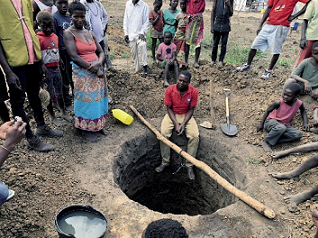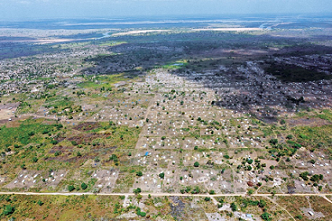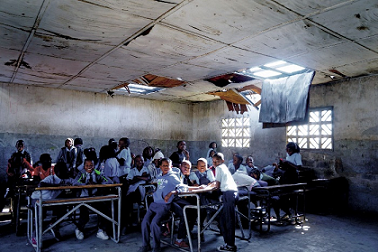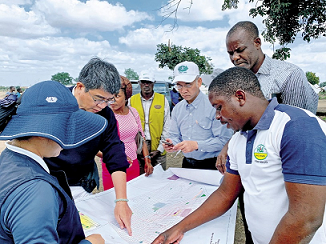Struggling to Survive
By Chu Yu-jia (褚于嘉)
Abridged and translated by George Chen (陳纘強)
Struggling to Survive
By Chu Yu-jia (褚于嘉)
Abridged and translated
by George Chen (陳纘強)
“Are you travelling to Mozambique for leisure?” A nurse in a medical clinic enquired when I requested for vaccination in August.
“I am joining a team of Tzu Chi volunteers to survey the damages in Mozambique. Many locals whose lives have been impacted by Cyclone Idai need our help there.” Five months ago, Mozambique was severely devastated by the cyclone. Its strong winds tore off roofs, and the floods it brought uprooted and washed away buildings and homes. Our trip in August aimed to survey the land provided by the local government for Tzu Chi to build a Great Love Village, as well as to visit schools devastated by the cyclone.

In Tica village of Nhamatanda District, locals use tools given to them by Tzu Chi to drill a hole to acquire water to irrigate the land. (Photo by Chen Bo-gen)
Mozambique is located on the south-eastern part of the African continent, opposite the island of Madagascar. It is an underdeveloped country with living environments and sanitary conditions very different from those in Taiwan. Communicable diseases, such as malaria, tuberculosis and AIDS, are prevalent there. Before our trip, all team members were reminded to receive vaccination for yellow fever, typhoid fever, hepatitis A and tetanus, as well as oral preventative medication for malaria.
The doctor provided a laundry list of precautions we were advised to take: avoid contact with any open wounds, do not stay in the vicinity of people showing coughing symptoms or stay in confined spaces that lack air circulation, such as tents; do not eat raw food or drink raw water; disinfect hands regularly with anti-bacterial wet wipes; ingest anti-malaria medicine as prescribed, etc. In short, we must be cautious about hygiene.
In truth, there has been no reported cases of yellow fever in the region so far. Vaccination is compulsory to prevent travelers entering the country from spreading the virus to the locals, and every traveler is required to show their proof of vaccination at the customs before receiving permission to enter the country. For extra caution, the air crew will spray the entire cabin with disinfectant mist once the plane enters the airspace above the African continent, which is a mist so thick passengers must hold their breath till it dissipates.
The Search for Clean Water
Water is an indispensable substance for sustaining life, but securing clean water sources after massive floods is extremely difficult. Even five months after Cyclone Idai devastated Nhamatanda District, the tap water available remains salty. We were told that the water quality was so poor earlier on that even by using it to rinse after brushing one's teeth could induce diarrhea. Fortunately, the water quality, although not fully satisfactory, is now adequate for safe daily use.
We soon found out that water faucets are a rarity in this country as we journeyed from our hotel to the villages. During our trip, we saw yellow bags serving as water containers, hand lever pumps used for drawing water, groundwater collection towers, and shallow water collection points.
Not every water source is clean, but to the residents, they are a critical source of sustenance. In the tented area, women and children carry buckets of different sizes every day to retrieve clean drinking water from the yellow water bags provided by international NGOs. As there are so many people but limited clean water resources, there is a regulation against using such water for farming. Therefore, even if there are open spaces beside the tents that can be used for growing vegetables, the locals cannot do so.

More than 2,000 people live in the tented area of Guara Guara, Buzi District. Each white spot seen in the aerial photograph taken on August 19 is a tent that is the home to a household. (Photo by Lin Wei-yang)
In one school, there is a manual water pump which is the source of water supply to its nearby villagers. We saw a girl in a dress who came to draw water from the pump. She gulped down a big mouthful of water before filling her pail to take home. Along the way, we passed some villagers tilling the land for farming. They used the farming tools Tzu Chi gave them to dig a shallow well to garner water. Although the water was muddy and unfit for drinking, they said it could still be used for washing and growing vegetables. However, the water from such a shallow underground level was also highly susceptible to contamination.
Eking Out a Living in Desperate Times
The locals who have lost their homes to Cyclone Idai moved to the land provided by the government and are now living in the tents provided by international organizations. Settling in a new place, how do they start life anew?
It appeared to us that many locals did nothing but idle their time away. Yet, while we surveyed the disaster areas, we noticed how some of them tried to make a living by distilling wine, firing pots, tailoring, by gathering stones to sell, or by selling fruits and vegetables.
In someone's yard, we saw a hollowed-out tree trunk filled with milky-white liquid being heated with fire underneath. The liquid dripped into a bucket set before the trunk drop by drop. No one in our team knew what it was, so the woman who was tending the fire opened a plastic bottle containing the liquid, supposedly to show us. Suddenly, the pungent smell of alcohol filled the air. It was then that we realized she was distilling wine.
Another Mozambican tradition is using handmade earthen pots for cooking. A female local approached our volunteer translator and invited us to her home to watch her make such pots.
She first took some clayey soil and water, and little by little, deftly shaped the clay into a pot before firing it till it hardened. Usually, she would sell her pots in a nearby market. The price varied according to their sizes, averaging about 10 to 30 Mozambican metical (US$0.16 to US$0.47) each.

This elementary school in Beira City has a history of more than 60 years and more than 3,000 students. Despite the hole in the roof, the children have a chance to change their destiny and strive for a bright future through studying. (Photo by Chu Yu-jia)
We also visited the home of Fatima, an illiterate single mother with a physical disability who had been abandoned by her husband. She singlehandedly supports her children by tailoring, a skill she picked up through the support of a charity organization.
Living in the Guara Guara’s tented area in the aftermath of Cyclone Idai, Fatima relies on tailoring and selling tomatoes for a living. Following her customers’ requirements, she hand-sews dresses for both children and adults. If the customers provide their own fabric, a dress would cost about 150 Mozambican metical (US$ 2.37). If the customer uses her fabric, a dress of hers could sell for 200 Mozambican metical (US$ 3.16).
During our conversation, Fatima expressed that she wished for a sewing machine because she'd lost everything she owned, including her wheelchair, due to the cyclone.
To be able to farm successfully, being close to the water source is necessary. Therefore, some farmers have to walk an hour every day to get to their fields.
One local who has five children used to make a living by repairing cars back in Tica village. After Cyclone Idai, he moved to a village that has less vehicles. As he can no longer eke out a living by repairing vehicles, he has no choice but to learn farming skills and use the tools provided by Tzu Chi to dig wells and till the land.
He happily explained to us how he grew such beautiful vegetables. However, he also expressed his concerns about not having seedlings in storage. He was uncertain about what he could grow after he used up all the seeds provided by Tzu Chi.
A Roofless School
“This is a school for 6,000 students?” Standing at the school gate, I uttered with astonishment. “It undoubtedly is.” Zhan Gui-qi (詹桂祺), Buddhist Compassion Relief Tzu Chi Foundation General Affairs Director, responded.
What I saw from the school gates was a dilapidated building built with corrugated metal sheets standing amidst a rubbish-strewn ground. It bore no semblance to what we would normally perceive as a school.
We would expect that a school would be a completely safe building standing on flat, clean ground, replete with greenery and red running tracks. However, upon entering the school, one is confronted with remnants of an old latrine pit on the left, and a flimsy shed on the right that looks as if it could be blown away anytime by a mere gust of wind. Stones placed on the rusty metal sheet rooftop served as a flimsy measure against such a potential mishap.
The school is located in Matola, a city in the southern part of Mozambique. It is the first school the exploration team visited upon arriving at Mozambique's capital, Maputo. Established in 1999, the school has 6,000 students ranging from Grade 1 to Grade 7, with classes run over 3 sessions daily.
The school has neither the usual football ground nor a basketball court. In the classrooms, three to four students share a desk only fit for two, and electric lights are only available in three classrooms, as they are also used for night classes. The principal of the school, Claudia Tene, told us that whenever a strong gust of wind noisily rattles the metal sheet roof, the students cannot concentrate in class. She also said that whenever the sharp shrilling screeches of the flapping roof and the hollowing growl of the wind gets too frightening for the students, they would run out of the classroom for safety. The school faces the challenge of increasing student intake, yet at the same time, some parents are unwilling to send their children to school in fear
that the roof will cave in.
Claudia said she is very happy that Tzu Chi has come to visit her school again, and she delightedly shared about the teachers’ participation in Tzu Chi’s activities. The teachers have also started incorporating Jing Si aphorisms into their courses, allowing the students to learn about the Jing Si aphorisms of their choice.
This school's state of disrepair is not unique in Mozambique. We surveyed around 20 to 30 schools during this trip, and the majority of these schools did not have enough classrooms and toilets for their students to begin with, and the lack of water and electricity supply were among the challenges these schools faced even before the cyclone hit. Now, in the wake of the cyclone, there are even less functional classrooms for the students to learn in. Therefore, whenever we could not find a school we wished to survey, we would remind ourselves to look carefully. If the roof of a building is broken or if it is missing a rooftop altogether, it's possible that the building in question is the school we were looking for.
Striving to Bring Them Hope
August is Mozambique’s dry winter season. The yellow sands swirling on the dry plains would form into sandstorms without warning. When that happened, as we were not equipped with protective gear, we could only turn our body against the wind, close our eyes and hold our breaths till the storm passed. It is hard to imagine that this arid land was once submerged in massive floods that inundated houses and farmlands back when Cyclone Idai hit in March.

Tzu Chi's assessment team and the local staff in charge of urban and rural development discuss the plan for the Great Love Village. (Photo by Xu Ya-ling)
During our 20-day trip, we surveyed the needs of 20 to 30 schools along the number 6 national highway in the province of Sofala. Sometimes, in order to ascertain the school boundary, our team members courageously followed the school officials into pathless, dense undergrowth to search for a certain tree or stone. Watching them disappear into the mass of tall weeds and trees, we could not help but anxiously wonder if there were any snakes lurking in the area.
Electricity and street lights are unavailable to most villages in Mozambique, and the roads are usually patchy. In order to prevent any potential accidents, our vehicle needed to be back on the number 6 national highway before it got dark. We were so pressed for time that we were even speaking at increased speed. Every day, even under the scorching sun, each team member worked hard to record factual information about the people and the environment as preparatory work for comprehensive planning.
Tzu Chi has launched a mid-term plan to aid Mozambique’s locals affected by Cyclone Idai. Besides planning to build safe residential shelters and schools, local Tzu Chi volunteers have also visited various villages to care for the poor and helpless people who are in need. These volunteers share knowledge on hygiene and encourage parents to send their children to school. A teacher once told us that children need to go to school if they want to learn the country's official language, Portuguese. Otherwise, they will only know the dialect that is spoken at home. Therefore, school education is a critical necessity. Their road to recovery is a very long one that requires us to work hard together for.
Contact Us | Plan a Visit | Donate
8 Lide Road, Beitou 11259, Taipei, Taiwan
886-2-2898-9999
005741@daaitv.com
©Tzu Chi Culture and Communication Foundation
All rights reserved.
